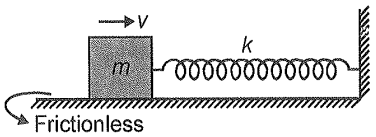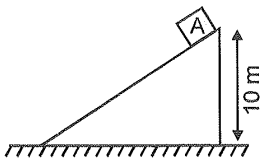A block of mass m is given a speed v when the spring of constant k is in its natural length as shown in the figure. The remaining kinetic energy of the block when spring is compressed by half of the maximum compression is:

(1) 25%
(2) 50%
(3) 75%
(4) Any value of less than 50%

A body of mass m moving at a certain speed suffers a perfectly inelastic collision with a body of mass M at rest. The ratio of the final kinetic energy of the system to the initial kinetic energy will be:
| 1. | \(m \over {m + M}\) | 2. | \(M \over {m + M}\) |
| 3. | \({m + M} \over m\) | 4. | \({m + M} \over M\) |
A shell fired from a cannon explodes in mid-air. It's total
(1) Linear momentum is not conserved
(2) Linear momentum is conserved
(3) Kinetic energy is conserved
(4) Potential energy is conserved
A constant force is applied on a body of mass 2 kg to give it a displacement . Work done by agent applying the force up to time t = 3 s is
(1) 3 J
(2) 9 J
(3) 18 J
(4) 2 J
A particle of mass 10 kg is moving with a velocity of m/s, where x is displacement. The work done by net force during the displacement of the particle from x = 4 m to x = 9 m is:
(1) 1250 J
(2) 1000
(3) 3500 J
(4) 2500 J
Two bodies A and B of mass m and 2m respectively are placed on a smooth floor as shown. They are connected by a spring of constant k. If a third body C of mass m moves with a velocity along the line joining A and B and collides head-on elastically with A, then speed of A at the instant of maximum compression is

1.
2.
3.
4.
1. \(\sqrt{2m^2L(g\sin\theta)^3}\)
2. \(\frac{2}{3}Lg^2\sin\theta\)
3. \(\sqrt{\frac{2}{3}m^2Lg^3}\)
4. \(mg\sqrt{2gL\sin\theta}\)
Which of the following statement is correct regarding potential energy?
(1) Change in potential energy depends upon reference point.
(2) Potential energy does not depend upon reference point.
(3) Potential energy can be defined for any field.
(4) Change in potential energy of any particle is equal to work done by external force for moving the particle in equilibrium in a conservative field.
A body A of mass 10 kg at rest starts slipping from the top of the inclined plane of height 10 m as shown. If it reaches the ground at 10 m/s, then work done by friction is

(1) 500 J
(2) -500 J
(3) 1000 J
(4) -1000 J
A body is released from the top of an inclined smooth plane of inclination . It reaches the bottom with speed u. If the angle of inclination is doubled keeping the height unchanged, then the speed of the object on reaching on the ground is
(1) u
(2) 2u
(3)
(4)






